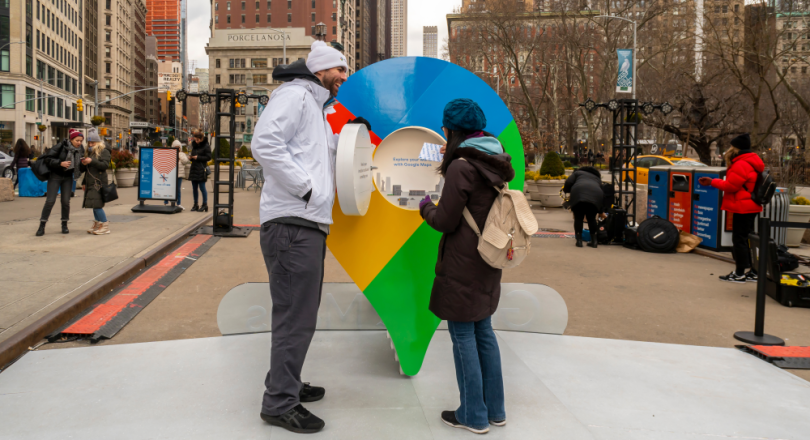The distribution of COVID-19 vaccines is ramping up — and so is our desire to return to group experiences and live events. Travel plans are being made, music festival line-ups are being announced and epidemiologists predict we’re about to enter a second “roaring ’20s,” in which people will party harder than ever to make up for lost time.
And, like consumers, brands are eagerly awaiting a return to normal.
This past year, brands had to shelve their experiential marketing plans — in-person promotional experiences like events, product showcases and pop-up activations — and scramble to create virtual ones.
Now, with pandemic restrictions expected to lift in the coming months, brands are plotting ways to reach consumers offline again.
“Digital is great, but everybody’s got content-Zoom fatigue,” said Jack Bedwani, who runs an experiential and influencer marketing agency called New Moon. “Experiential is ... a big part of how [brands] stay relevant, current, popular.”
But coexisting with the buzz as brands and agencies roll up their sleeves to get back to experiential campaigns is an understanding that not everything will be the same.
Nobody Wants to Go First
While brands are excited to offer in-person experiences as soon as possible, “no one wants to be the first,” said Cara Kleinhaut, founder and CEO of AGENC, an experiential marketing agency based in Los Angeles and New York.
“The brands are tip-toeing,” she added.
Safety is the number-one concern right now — and nobody wants to be the cause of a super-spreader event — so brands are in a holding pattern. But as soon as one brand takes the plunge, Kleinhaut expects a domino effect, giving others confidence to go full steam ahead with their experiential marketing plans, assuming the first event goes smoothly.
We’ll See Some Experiential This Summer
“Consumers are demanding experiences,” Rick Cosgrove, president of Agency EA, told Built In. That’s why he expects consumer-oriented brands to be the first ones back — as early as this summer.
Bedwani agrees. He suspects the early adopters will be brands used to marketing toward younger people — the cohort he believes is most eager to get outside and gather.
For some brands, plans are already underway. Jen Fisch, executive creative director at BeCore, an experiential agency based in Los Angeles, told Built In that a few of her clients are planning in-person events for as early as June.
Others aren’t quite ready to make the leap yet, she said, and some are skipping experiential plans altogether for 2021.
“The speed of vaccinations has brought a lot of confidence,” Fisch added, but everyone is still staying vigilant, closely monitoring the constantly evolving information.
Safety Will Become a Bigger Priority
For the foreseeable future, events and activations will come with fixtures that emphasize health and safety.
Sanitizer dispensers stationed throughout events and frequent wipe-downs of surfaces are expected to be the norm, at least for the near term. (Service workers at these events will probably be masked and gloved through the rest of the year, Bedwani guesses.) And touchless technology is poised to be incorporated into more and more events, Cosgrove said. Gone are the days where everyone puts their grimy hands on the same stuff.
Such precautions will shake up staffing too. Agencies and brands will probably appoint experts whose jobs are to make sure everything is safe and compliant.
“If you’re doing anything experiential, you’re going to have to have a COVID czar.”
“If you’re doing anything experiential, you’re going to have to have a COVID czar,” Corey Newman, executive vice president and head of innovation and consulting at Deutsch in New York City, told Built In. “It’s an extra cost to production, but, in general, it’s important and helpful.”
And for bigger events, camera presence is expected to increase. Covering every angle may help authorities conduct contact tracing if a super-spreader event were to occur.
Experiences Will Be Lower in Attendance, Outdoors and More Spaced Out
To abide by safety protocols — and accommodate what will likely be a more-cautious public — many brands will start small in their experiential marketing plans in the near future.
We won’t see 500-person events held until at least the fall, Bedwani said. But he wonders if 20-to-50-person, brand-funded private events and dinners will pop up this summer, “like the old Tupperware shows of the past.”
Cosgrove said his peers at other agencies who are planning experiential marketing activities for the summer are focusing on smaller pop-up activations — installations meant only to be experienced by a few people at a time. Nothing that’s designed to draw large crowds at once.
This staggered approach to participation also means that the time spans of experiences are expected to be stretched out. An event that would normally run for a day and a half might have to run for three days now, to reach the same number of consumers.
And to keep density low, physical space will also have to be expanded. Kleinhaut gave an example that, to accommodate a group of 50 people safely and comfortably, brands will have to invest in tents three times the size they would spring for under pre-pandemic conditions.

B2B Events Will Come Later in the Year
B2B companies, which are Agency EA’s main clientele, are generally expected to sit the summer out, Cosgrove said. Those types of events tend to draw large crowds — sometimes thousands of professionals — that are focused on networking, shaking lots of hands and mingling in close quarters with strangers who have been traveling.
People aren’t allowed to gather in groups that large yet. Say nothing of their personal comfort levels. And while the planning phase for many B2B events are in full swing, people shouldn’t expect to see them earlier than the fall — and many companies are waiting until 2022, Cosgrove said.
Packaging and Sampling Will Change
Consumer packaged goods (CPG) brands are common proponents of experiential marketing. After all, theirs are products you can taste. But with cleanliness a looming public concern, they’ll have their work cut out for them.
“We’re gonna see a bigger shift in packaging,” Cosgrove said.
He expects to see fun-sized bars, pre-packaged snacks and miniature cans become mainstays at events from here on out.
Fisch, who works with several beverage and alcohol clients, said she and her agency are currently thinking through how to approach sampling as events start back up. She said she envisions a move back to handing out full cans, rather than pouring drinks into cups and handing them out.
“That’s dead,” Cosgrove said.
Hybrid Events Will Stay ... Forever
Brands and agencies had to pivot to virtual in 2020, and leaning into a more content-heavy approach was a challenge for many, especially for ticketed events where being there in person is often the main draw.
But since agencies have built up a muscle for putting on virtual events — and consumers have grown somewhat accustomed to them — they are going to stick around, even well after pandemic concerns subside.
Intertwining in-person experiences with virtual ones, and figuring out how those two realms overlap in real time, will be a major focus for experiential marketers.
“We should always be thinking hybrid,” Fisch said. Even when clients turn their focus back to in-person events, “we should still be layering on what that virtual experience looks like.”
“We should always be thinking hybrid.”
In-person experiences will always be “where the magic happens,” Kleinhaut said. “But ... we have these expanded audiences from virtual, so we want to keep that.”
And, she added, “sponsors love it.”
Although they tend to come with larger budgets and additional logistical challenges, events that include a virtual component result in larger audiences, since they pull in people who otherwise can’t attend.
Another reason why brands are bullish on hybrid experiences: The virtual side allows them to capture additional customer data.
Expect a Greater Emphasis on Wellness
Reports of depression and anxiety have skyrocketed in recent months, as the pandemic — in addition to political turmoil and widespread injustices against marginalized groups — has left people reeling.
Brands that recognize this — and carefully address it in their experiential marketing campaigns — are going to be well-positioned to resonate with consumers, according to Newman.
“There’s going to be a huge push for emotional wellness,” he said.
Newman cited Smirnoff and Vans as examples of brands that others might try to emulate as they think through how to connect empathetically with consumers during difficult times.
Smirnoff sponsored a campaign that trained bartenders and other volunteers to provide nighttime safety and harm intervention for members of the LGBTQIA+ community in Manchester, England. And Vans has commissioned public murals in tandem with efforts to promote mental-health awareness.
While consumers attend events and engage with pop-up brand installations “looking for catharsis ... they’ll also be looking to do maintenance on the self,” Newman said. “Brands that can effectively create events that broach that subject in a kind way, and actually provide value, I think it’ll be huge for brands.”
2022 Will Be a Year to Remember
While excitement is high for the world to open back up to the public over the next several months, 2021 is still expected to be a relatively cautious year for brands that are used to giving consumers events to attend and activations to touch.
But the long-term outlook for experiential marketing is still bright — maybe more than ever before, with the pandemic lockdown putting the importance of public gatherings into sharper focus.
“Experiences are going to become even more important in our culture,” Fisch said. “People are going to appreciate them more.”
Kleinhaut put it even more squarely: “I don’t think there’s an invitation that’s going to go unopened in 2022.”




